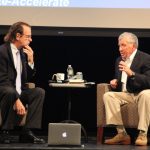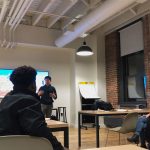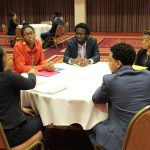Innovators and entrepreneurs packed into a shared workspace Wednesday to hear what tips business professionals with years of experience had on creating relationships in the startup industry. Panelists shed light on different strategies for companies as large as Google to brand-new startups.
The Startup Coalition hosted the Wednesday evening talk at the South Station location of WeWork, a group of Boston-area business professionals who provide resources and guidance to local startups to a group of around 150 people. The panel featured speakers from Google, Ascent Venture Partners, DipJar and WiseHer for the talk titled “Leveraging Strategic Partnerships to Accelerate Your Startups Growth.”
Chris Donovan, co-founder of The Startup Coalition, moderated the discussion and encouraged members of the audience to interact with the speakers and ask questions.
Chris Selland, CEO of DipJar, said small and big companies have different dynamics when it comes to strategic partnerships. He encouraged entrepreneurs and entry-level startups to look at the partnerships from a big company’s perspective.
Selland said big companies have product managers who are trying to launch a platform, and they need other companies to build on and validate this.
“The big company probably doesn’t need your validation,” Selland added. “They don’t need your press release, and they don’t need your logo on their website. You might need all those things with a partner, but they don’t need you.”
While recent volatility has shaken some financial markets, Donovan said he remains optimistic about the startup culture and entrepreneurial spirit in Boston.
“I’ve actually been in the entrepreneur community for about 30 years,” he said. “I think it’s at the highest level I’ve ever seen right now. The types of companies, the quality of companies, the number of entrepreneurs, … I’m very encouraged by what I see in the community.”
Donovan said he is impressed by the shared pride younger entrepreneurs have for their industry.
“The dedication and hard work they put in together — I think it bodes very well for Boston, because instead of going into a big company, I see a lot of young individuals going into starting their own initiative to try to find a way from the get-go,” Donovan said.
Alfston Thomas, a sophomore at Northeastern University who is majoring in finance and computer science, is the co-founder of Huntington Angels. The startup company is an independent, student-run venture capital firm.
“One big thing I noticed, hanging out with a lot of my friends who are entrepreneurs, is that their core competencies are building out products and not necessarily navigating the fundraising process, which can be extremely difficult,” Thomas said. “So, to try to fill that gap, we started [Huntington Angels].”
He said his firm served a need on the university’s campus to make funding for business projects more obtainable.
“Northeastern University students felt this was a need, because we have a lot of really great ventures but don’t get as much attention from investors as universities in Boston such as Harvard and MIT,” Thomas said.
Thomas said that he initially knew almost nothing about the venture capital industry when he started, but he has since learned a great deal.
“[Huntington Angels has] been able to close a few deals within the year that we passed, and we developed relationships with a lot of key members of the Boston community,” Thomas said. “Personally, as a student, it’s one of the best learning opportunities I’ve come across.”
Cassandra Pearce, the community lead in sales at WeWork’s South Station location, said she felt the audience walked away having learned from the panel.
“I think the event was really great,” Pearce said. “The crowd was really engaged and asked some awesome questions.”
Pearce added that she had some entrepreneurial ideas of her own and that through her interactions with people at WeWork, she has gained inspiration.
For students and young entrepreneurs, Donovan had two words: build relationships.
“You’re going to learn an awful lot at a university or a college, but I think it’s also to build relationships, attend events, but meet people like here tonight that have a lot of experience in logic companies and building out companies,” Donovan said. “Those are the types of people that can give you the real information you need to be successful.”




